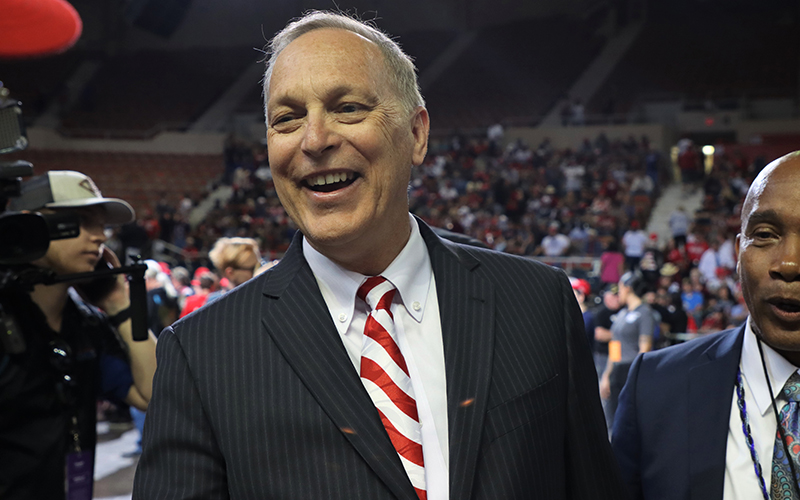
Rep. Andy Biggs, R-Gilbert, was one of just two House members to vote against a bill allocating $8.3 billion to fight the coronavirush Wednesday. (Photo by Reno Del Toro/Cronkite News)
WASHINGTON – The House late Wednesday approved $8.3 billion in emergency funding to combat the coronavirus, passing the measure an overwhelming 415-2 vote – with an Arizona lawmaker counting for one of the two “nays.”
Rep. Andy Biggs, R-Gilbert, said after the vote that the original $2.5 billion request from the Trump administration was sufficient to fight the outbreak, and that throwing money at the problem with a “larded-up bill” would not help.
“In true Washington, D.C., fashion, congressional appropriators turned the president’s reasonable $2.5 billion request into a bloated $8.3 billion package,” Biggs said in a statement released by his office. “Throwing money at a potentially serious issue does not alleviate the American people’s concerns. Nor does politicizing the issue to score points for future elections.”
Political analysts said it is not surprising that Biggs, the chairman of the conservative Freedom Caucus, would frame his vote as one for fiscal restraint. But with a disease that had infected more than 93,000 people worldwide and killed just under 3,200 as of Wednesday, they wondered about the wisdom of taking a vote on principle.
“Look, everyone admires principle,” said Jason Rose, an Arizona political consultant. “It’s one thing to vote against a porked-up piece of legislation that bails out Wall Street.
“This – in which millions of people, tens of thousands of people could die – wow,” Rose said. “I don’t think that’s the time for statement, I think that’s the time for common sense.”
Rep. Raul Grijalva, D-Tucson, was at a funeral in Arizona, his office said, and did not vote Wednesday. Every other member of the state’s congressional delegation, budget hawks included, voted for the bill.
House and Senate negotiators spent days negotiating the deal, which calls for $3 billion for vaccine development and research as well as $2.2 billion for the Centers for Disease Control and Prevention for each of the next three years.
The bill also allocates $950 million in funding to support state and local health agencies in their fight against COVID-19, the disease caused by the coronavirus, and $40 million in funding specifically for tribal communities, among other items. There is also funding for Small Business Administration loans to help businesses recover from any economic impact they suffer as a result of the disease outbreak.
Language in the bill requires that funds be used only to fight coronavirus and other infectious diseases, while increasing seniors’ access to telemedicine services for better treatment.
The Senate approved the bill 96-1 Thursday, after rejecting an amendment by Sen. Rand Paul, R-Ky., that would have made cuts elsewhere in the budget to pay for the coronavirus funding. Only Paul voted against the final bill; both of Arizona’s senators supported it.
Rep. Tom O’Halleran, D-Sedona, said Wednesday that he was pleased to see House members setting aside political differences for a common cause.
“Arizonans I talk to are concerned for the health of their loved ones and troubled by reports of community viral spread as health officials work to understand the coronavirus,” O’Halleran said in a prepared statement. “This funding package … will address the rapid spread of this disease in rural and tribal communities across Arizona, and work to keep American families healthy and informed.”
Rep. Ruben Gallego, D-Phoenix, introduced his own bill Tuesday to guarantee care for anyone infected with COVID-18, saying no one “should be forced to put their own health and lives – and the health and lives of those around them – at risk because they can’t afford critical medical care.”
While Biggs’ vote against the bill, with Rep. Ken Buck, R-Colo., might strike some as risky, at least one political analyst said he does not think Biggs will see too much backlash.
“The district he lives in is a very-heavy Republican district, and also I know he is a member of the Freedom Caucus,” said Mike Noble, chief of research at OH Predictive Insights. “It’s probably not going to affect him too much in his election, unless this becomes a massive pandemic locally.
“He (Biggs) has always been a fiscal hawk. So when it comes to the dollars portion, I think it is more of a political statement on government spending,” Noble said.


